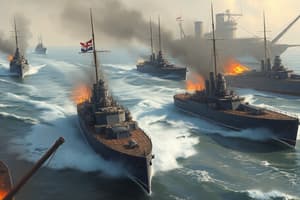Podcast
Questions and Answers
What is the term for the method used by Germans to attack civilian ships with submarines during WWI?
What is the term for the method used by Germans to attack civilian ships with submarines during WWI?
- Trench warfare
- Neutrality
- War bonds
- Unrestricted submarine warfare (correct)
Which toxic chemical, causing blistering of the skin and lungs, was used in WWI warfare?
Which toxic chemical, causing blistering of the skin and lungs, was used in WWI warfare?
- Propaganda
- Mustard gas (correct)
- Depth charge
- Reparations
Which alliance in WWI included Germany, Austria-Hungary, and the Ottoman Empire?
Which alliance in WWI included Germany, Austria-Hungary, and the Ottoman Empire?
- Fourteen Points
- Allied Powers
- Central Powers (correct)
- Harlem Hellfighters
Where did the African-American Regiment called Harlem Hellfighters fight during WWI?
Where did the African-American Regiment called Harlem Hellfighters fight during WWI?
'Images and slogans combined to convince people to believe in a certain idea' is the definition of which term?
'Images and slogans combined to convince people to believe in a certain idea' is the definition of which term?
'An area where no military presence is allowed' is known as what?
'An area where no military presence is allowed' is known as what?
'Purchased from the government at a set price and cashed in later with interest' best describes what concept?
'Purchased from the government at a set price and cashed in later with interest' best describes what concept?
'Monetary payment used to right a wrong' is the definition of which term?
'Monetary payment used to right a wrong' is the definition of which term?
'A peace document signed by the Allies and Germany at the end of WWI' refers to what?
'A peace document signed by the Allies and Germany at the end of WWI' refers to what?
Flashcards are hidden until you start studying
Study Notes
World War I
- Unrestricted submarine warfare was practiced by Germans, involving submarine attacks on civilian ships.
- Neutrality refers to not choosing sides in a conflict.
Warfare Tactics
- Trench warfare involved armies digging trenches for protection from enemy gunfire.
- Mustard gas was a toxic chemical used in warfare, causing skin blistering and lung damage, leading to a painful death.
Naval Warfare
- U-boats were naval submarines used by Germany in World War I.
- Depth charges were explosives used to destroy submarines.
Alliances
- Allied Powers consisted of France, Great Britain, Russia, Italy, Japan, and the United States (from 1917).
- Central Powers included Germany, Austria-Hungary, and the Ottoman Empire (modern-day Turkey).
Key Players
- Harlem Hellfighters were an African-American Regiment that fought on the front lines of World War I with the French.
Financing War
- War bonds were purchased from the government at a set price and could be cashed in later with interest.
Propaganda and Diplomacy
- Propaganda involved using images and slogans to convince people to believe in a certain idea, often by the government.
- The Fourteen Points, presented by President Wilson in 1918, outlined his plan for peace after WWI.
- The Treaty of Versailles was a peace document signed by the Allies and Germany at the end of WWI.
Post-War Consequences
- Reparations involved monetary payments to right a wrong.
- A demilitarized zone is an area where no military presence is allowed.
- Annexation refers to the act of adding a territory to a country.
Studying That Suits You
Use AI to generate personalized quizzes and flashcards to suit your learning preferences.




